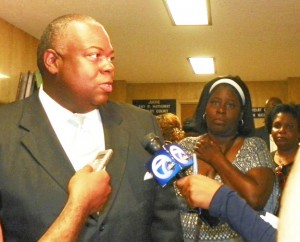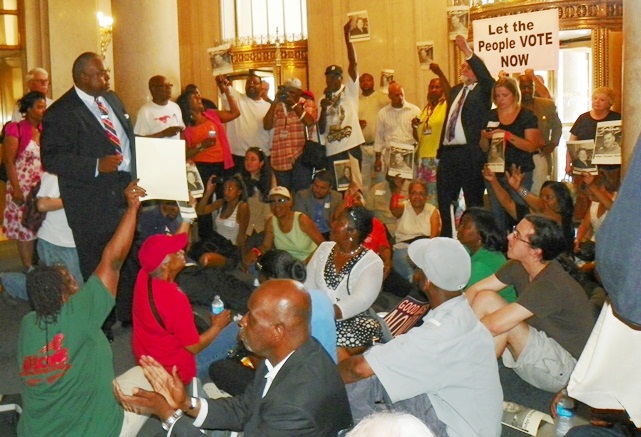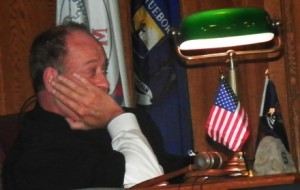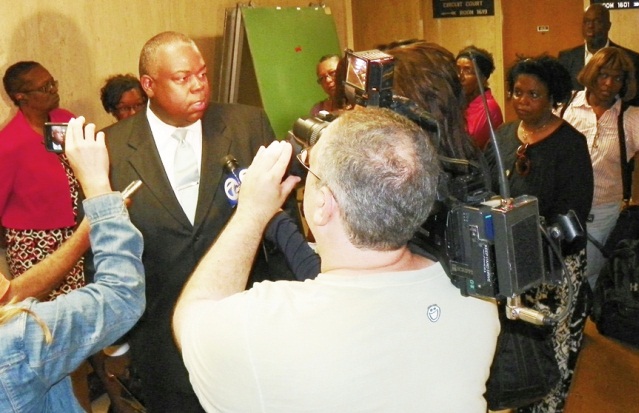
- Plaintiffs’ attorney Herbert Sanders, backed by some of dozens who packed the courtroom to support lawsuit against Detroit consent agreement, speaks to media after hearing July 13, 2012.
Next hearing Thurs. July 26; state high court to hear case against PA4 referendum Wed. July 25
By Diane Bukowski
July 15, 2012
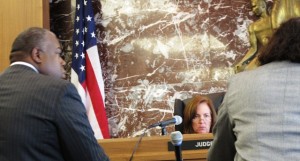
- Wayne County Circuit Court Judge Amy Hathaway listens to arguments in earlier case against city filed by AFSCME. Atty. Herbert Sanders is at left. Hathaway is runnning for re-election this year.
DETROIT – Wayne County Circuit Court Judge Amy Hathaway ordered a two-week delay July 13 on an emergency hearing in a citizens’ lawsuit against the city’s PA4 consent agreement. The request for a declaratory judgment in Rose Roots, Yolanda King and Yvonne Ross v. the City of Detroit, Mayor Dave Bing, and the City Council, is now to be heard Thurs. July 26 at 9 a.m.
She denied requests by the defendants to further delay or quash the suit, took under advisement a motion by attorneys for Mayor Dave Bing to bar the Corporation Counsel’s office from representing the City in the suit, and granted a state motion to intervene.
The lawsuit alleges that city officials did not have the right to enter into the April 4 “Fiscal Stability Agreement” with the state because the state owes the city over $307 million in revenue sharing payments, water and electric bills, and other debts.
The allegations are the same made by Detroit Corporation Counsel Krystal Crittendon in her suit against the consent agreement, which targets the state of Michigan, Gov. Rick Snyder, and Treasurer Andy Dillon as defendants.
“We are asking the court to uphold the rights of the people with regard to the consent agreement,” attorney Herbert Sanders, who represents the plaintiffs, said. “The plaintiffs are saying city officials had no authority to enter into it in the first place. The State has no affidavits or other proof saying they don’t owe the debt involved, but we have affidavits and city records kept in the normal course of business. The state is in default to us.”
Sanders called the delay “unfortunate.”

- Michigan Gov. Rick Snyder and Detroit Mayor Dave Bing are “joined at the hip,” according to an earlier comment from Bing.
“The Mayor and state attorneys used the same tactics being used to challenge the peoples’ right to vote on the referendum to repeal Public Act 4. But we will continue to fight this battle in the courts and on the streets.”
Earlier, on July 11, over 400 opponents of Public Act 4 once again occupied Cadillac Place, the state’s office building in Detroit, demanding that the State Court of Appeals get Stand Up for Democracy’s referendum on the ballot in time for the November election.
In contrast, the state’s Supreme Court moved swiftly to set a hearing on an application for leave to appeal by Citizens for Fiscal Responsibility. The group, which filed the initial challenge to the referendum, is asking that the high court strike down the appeals court ruling that the referendum is valid. That hearing is to take place Wed. July 25, at 10 a.m.
“Each side will have 30 minutes for oral argument,” the Supreme Court said in its order. “At oral argument, the parties shall address: (1) whether plaintiff actually complied with the 14-point type requirement in MCL 168.482(2), specifically given the terms “point” and “type;” and (2) if not, whether substantial compliance with the 14-point type requirement in § 482(2) is sufficient to give plaintiff a clear legal right to certification of the petition.”
The same Supreme Court has yet to hear arguments in a lawsuit filed on behalf of plaintiffs around the state in 2011 asking that Public Act 4 be declared unconstitutional and struck from the books.
“My parents fought for civil rights in the South,” Yolanda King, a plaintiff in the lawsuit against the city, said July 13 after the hearing. “But now we are going back to the days where we had no right to vote. The money the state owes us would get the city out of the red. We are facing hundreds of lay-offs, the closing of recreation centers, the health department and other vital services. We don’t have the right leaders. There is no way they should have entered into an agreement giving away our power, our jewels and our right to vote.”
Co-plaintiff Yvonne Ross said, “We have expressed our displeasure beginning with the formation of the financial review team. We feel everybody including the state of Michigan ought to follow the rules. It is illegal to contract with an entity in default to the city.”
King and Ross are both city workers and taxpayers. The third plaintiff, Rose Roots, is a city retiree.

- Attorney Michael McGee, representing Mayor Bing, rushes past VOD trying to avoid being photographed after court hearing July 13, 2012.
Mayor Dave Bing, the City Council and the state sent a battery of attorneys to the courtroom to fight to maintain the consent agreement, which guts city officials’ authority over everything. It has now led to the union-busting unilateral “City Employment Terms” contract being presented to the City Council July 13 by the Financial Advisory Board.
Bing’s attorneys from the law firm of Miller, Canfield, Paddock and Stone, including Michael McGee, a co-author of Public Act 4, asked that the office of the Corporation Counsel be barred from representing the city during the proceedings.
McGee has been omnipresent, appearing at City Council to tout the consent agreement, at Financial Advisory Board meetings, and in Ingham County Circuit Court during a hearing on Crittendon’s lawsuit. Asked to comment, he rushed past VOD trying to avoid having his photo taken.

Lawsuit supporters discuss hearing afterwards.Tyrone Travis, a member of Free Detroit, No Consent, at center, is suing City Council President Charles Pugh for ousting him from City Council meeting in violation of Open Meetings Act.
“It’s a good question where the money to pay Miller Canfield is coming from,” Sanders said. “We are not aware that the Corporation Counsel hired anybody. “From my understanding, Attorney McGee helped draft Public Act 4 and was also involved in the drafting of the consent agreement. It is ironic that they are now representing the Mayor, giving at least an appearance of impropriety.”
Under the current City Charter, the Corporation Counsel must approve any outside counsel hired to represent the city.

- Assistant Corporation Counsel James Noseda on behalf of City of Detroit arguing against consent agreement in front of Ingham County Circuit Court Judge WIlliam Collette June 13, 2012.
Assistant Corporation Counsel James Noseda, present to defend the City of Detroit, admitted that the plaintiffs’ grounds are identical to the grounds cited in Corporation Counsel Crittendon’s lawsuit, but said his office is still entitled under terms of the Charter to represent its clients, which include the City of Detroit as a whole, and the Mayor and City Council as requested.
Hathaway said she would rule later on whether the Corporation Counsel’s office can represent the city at the hearings.
She granted a motion by the State of Michigan to intervene in the case.
“I objected to the state intervening,” Sanders said. “In Corporation Counsel’s lawsuit, the state argued that they could not be sued because they have sovereign immunity, trying to get out of the suit. But now they are arguing that they want to be in this case.”
Ingham County Circuit Court Judge William Collette summarily dismissed both Crittendon’s suit and her motion for reconsideration, the last on July 12. She has 21 days to file an appeal from the Court of Claims to the state’s Court of Appeals. Crittendon met in closed session with the City Council and its Research and Analysis Division July 11 to discuss the appeal.
“Take it to the bank, she must and will appeal as is required by our city’s charter,” former Mayoral candidate Tom Barrow commented. “The Judge is simply wrong and she knows it. She gave him a chance to correct his obvious mistake and he refused. She is correct to follow the law to its ultimate conclusion and that means an appeal.”
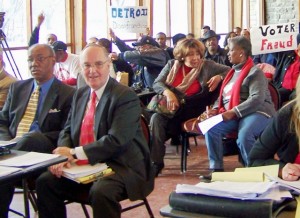
- Tom Barrow (l) is backed by dozens of supporters during Wayne County Board of Canvassers hearing in which he challenged validity of 2010 mayoral election.
Barrow said he has appealed his challenge to the 2009 Mayoral election to the U.S. Supreme Court. The Wayne County Board of Canvassers declared over 51 percent of the ballots cast in that election “unrecountable” due to gross irregularities.
Major media outlets continue to blame Crittendon’s suit as well as other “legal proceedings” for Wall Street bond ratings agencies continued downgrading of Detroit’s status. However, it is the bond ratings agencies themselves who are attacking Detroit to get the last drop of blood out of the city. The banks who pay them got $597 million in payments on the city’s debt in the 2011-12 fiscal years.
The city’s budget for 2012-13 sets aside $106,911,659 for a 2009 POC Swap Hedge Fund payment, aside from the remainder of outstanding debt. That payment results from an agreement the city entered into to avoid defaulting on a $1.5 billion Pension Obligation Certificates loan in 2005, under former Mayor Kwame Kilpatrick.
That loan was foisted on the city by representatives of Standard and Poor’s and Fitch Ratings, who came to the City Council table and threatened the city with bond downgrades if they didn’t agree to the deal.
Instead of making the workers and residents of Detroit pay for Wall Street’s greed, many in the city are demanding a moratorium on Detroit’s debt to the banks.
To read lawsuit, click on Root v Bing – 1st Amend Complaint.

